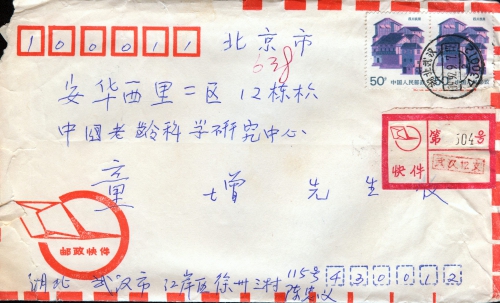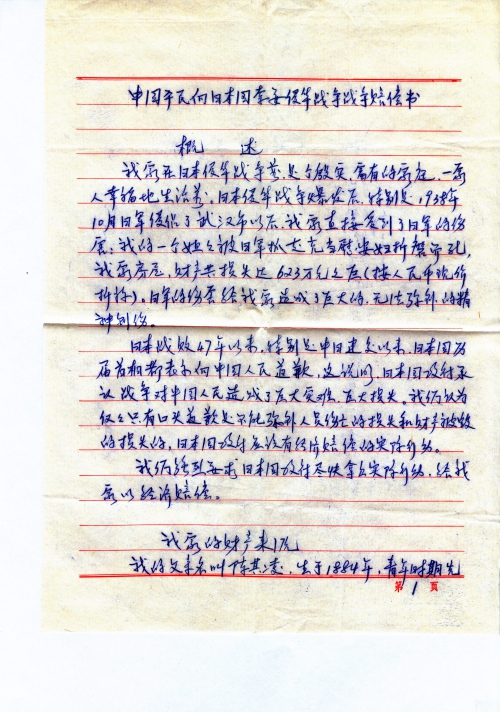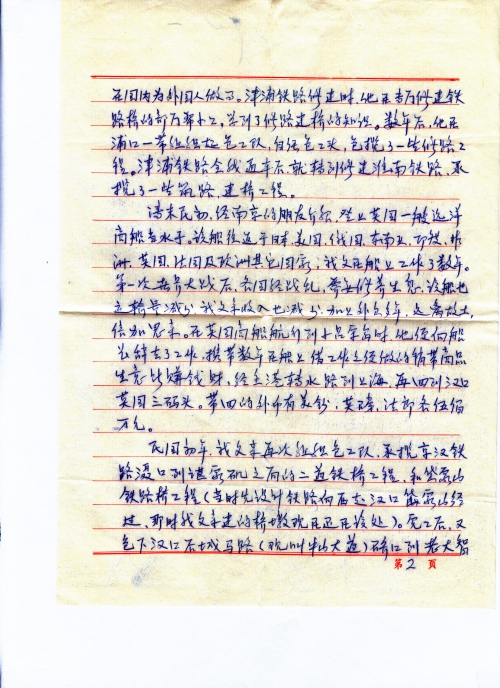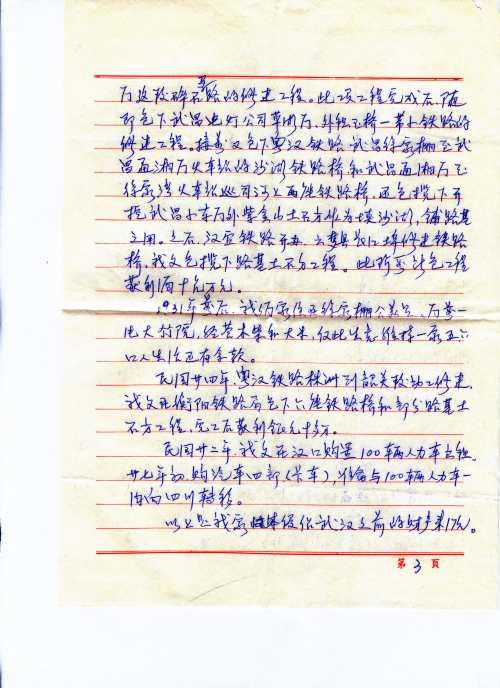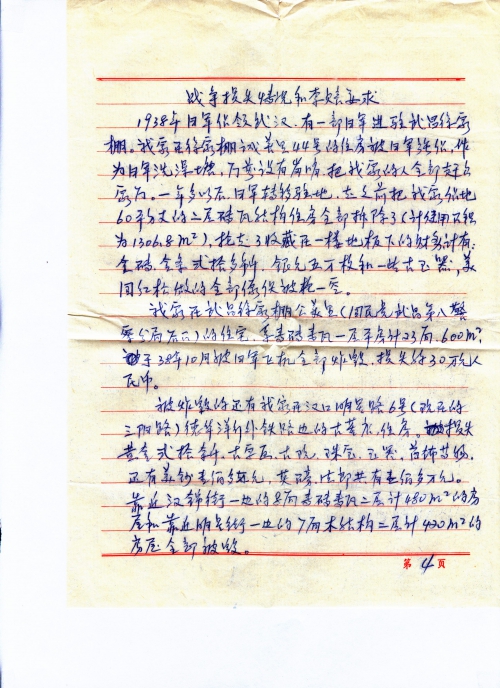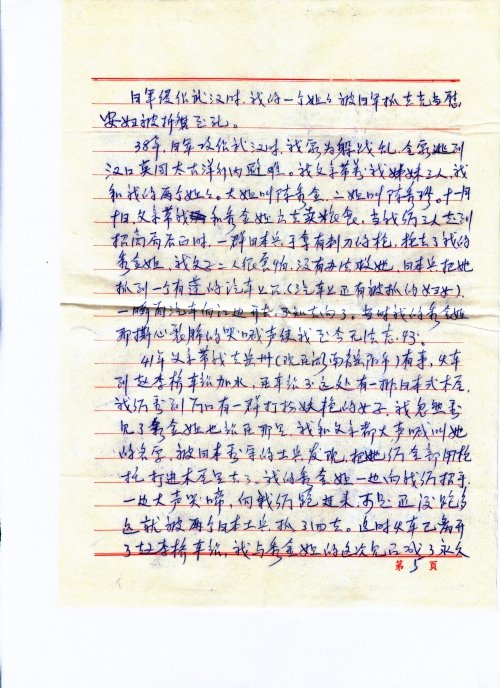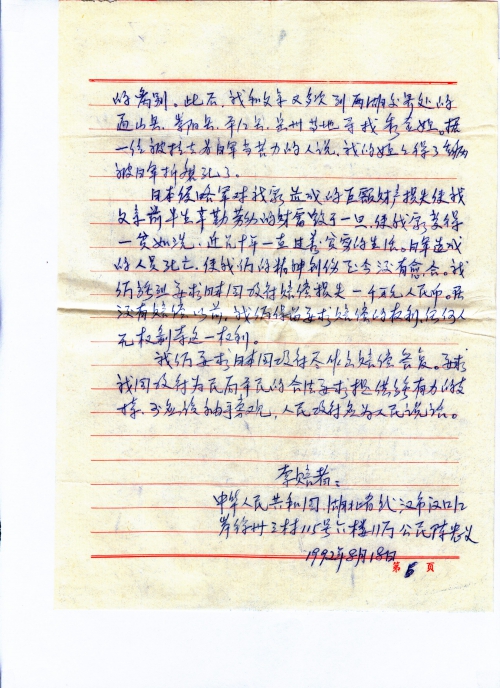Date of letter:1992-08-18
Address of author:Wuhan City, Hubei Province
Date of event:1938
Location of event:Wuchang, Wuhan City, Hubei Province
Name of author:Chen Zhongyi
Name(s) of victim(s):Chen Xiujin (Chen Zhongyi’s elder sister), Chen Qiling (Chen Zhongyi’s father)
Type of atrocity:Sex Slaves, Others, Air Bombings (SS, OT, AB)
Other details:1. In 1938, after the Japanese occupied Wuhan, Chen Zhongyi’s elder sister Chen Xiujin was taken as comfort woman by the Japanese and tortured to death. 2. His father Chen Qiling’s house was violently occupied with belongings taken away.Loss of housing property was about 6.23 million yuan (equivalent at current prices). 3. Houses were bombed in October.
Letter to Claim War Compensation from Japan by Chinese Civilians
Overview
Before the Japanese War of aggression against China, my family was a substantial and wealthy family, and lived a happy life. After the Japanese War of aggression against China broke out, especially after October 1938 when the Japanese troops occupied Wuhan, my family directly sustained damage from the Japanese Army: One of my elder sisters was captured by the Japanese Army to serve as comfort woman and later tortured to death, total loss of our house, and assets reached 6.23 million yuan (converted into RMB at current price). The damages caused by Japanese Army brought tremendous and irreparable mental trauma to us.
Since the surrender of Japan 47 years ago, especially since the establishment of diplomatic relation between China and Japan, all previous and current prime ministers of Japan apologized to the Chinese people, which implied that the Japanese government admits the War has brought huge disaster and huge loss to the Chinese people. We consider that oral apology alone cannot make up for the loss of casualties and the loss of property, the Japanese government must demonstrate real action for economic compensation.
We hereby strongly demand the Japanese government to take real action as soon as possible, and give my family economic compensation.
My family’s source of wealth
My father Chen XX, born in 1884, worked for foreigners in China when he was young. When the Jinpu Railway was in construction, he worked in the department responsible for building and maintenance of railway bridge, where he learned knowledge about construction of railway bridges. Several years later, he organized a construction team around Pukou, he worked as labor contractor, and undertook some road construction projects. After Jinpu Railway was fully completed and started operation, he transferred to build Huainan Railway, and undertook some road construction and bridge construction projects.
Near the end of the Qing Dynasty and the beginning of the Republic of China, through recommendation by a friend in Nanjing, he boarded a British merchant ship to work as a sailor. This ship travelled between Japan, USA, Russia, Southeast Asia, India, Africa, Britain, France and other countries in Europe. My father worked several years on the ship. After WWI, the ship he worked for experienced drop in transport volume. My father’s income also declined, coupled with long years of away from home, he missed the family more. When the British merchant ship travelled to Luzon Island, he informed the captain of his resignation and quitted the job. With the extra money he earned from years of privately shipping goods for others on board the ship he worked, he set off to Shanghai via Hong Kong by sea, then returned to Hankou British No.3 Wharf. The foreign currencies he brought back included US dollars, British pounds and French franc 5 million each.
In the early years of the Republic of China, my father again organized a construction team to undertake two railway bridge projects between Shekou to Chenjiaji of the Jinghan Railway, and Daijiashan railway bridge project (the design was to run the railway toward west to pass Hankou Daijiashan, the bridge pier built by my father is still standing today). After completion, he also undertook the construction project of the Macadam Road from Hankou Houcheng Road (Now Zhongshan Road) crossroad to Laodazhimen. His next project was the construction of a small railway around Caohumen, and Waizuyuqiao of the Wuchang Electric Lamp Company. He continued with more projects including the Shahu Railway Bridge on Yuehan Railway from Wuchang Xujiapeng to Wuchang Tongxiangmen Railway Station, and two railway bridges on the Xunsi River from Wuchnag Tongxiangmen to Xujiawan Railway Station. He also carried out a project to dig earthwork of Zijinshan outside Wuchang Xiaochemen to fill sand lake and deploy road bed. When the Hanyi Railway began construction, he went to Mengxian County Yangtze River wharf to build railway bridge and was in charge of the road bed earthwork sub-project. At this stage, his contracting projects earned over 100,000 yuan.
Around 1931, our family lived in Gongmeili, Xujiapeng, there was a large bamboo yard in front of the house. We sold firewood and rice, this business alone was enough to support 5-6 people in our family with surplus to spare.
In 1935, construction began at Zhuzhou to Shaoguan section of Yuehan Railway. My father undertook six railway bridges and partial road bed earthwork engineering project at Hengyang Railway Bureau. He earned over 100,000 silver dollars from these projects.
In 1933, my father purchased 100 rickshaws for rent in Hankou. In early 1938, he purchased 4 trucks and was ready to transfer to Sichuan together with his 100 rickshaws.
The above is a summary of the sources of my family’s wealth before the Japanese army invaded Wuhan.
War Damage Details and Compensation Claim
In 1938, the Japanese army occupied Wuhan, one division of the Japanese army entered and garrisoned at Wuchang Xujiapeng. The family residence at Xujiapeng was occupied by the Japanese Army to use as the Japanese Army’s bath house. There was a guard in front of the gate. They drove all of us out of our home by force. Within one year, the Japanese Army relocated their camp ground to other areas. Before their departure, they totally dismantled our two-storey brick and tile building with an area of 666.6 sqm (total usable area was 1306.8m2). They looted valuables (articles) hidden under the floor boards of the first floor, including: 20 catties of gold bullion and gold bar, 50,000 silver dollars and some ancient jade articles, all furniture items made of American red pine were plundered.
My family residence at Gongmeili, Xujiapeng in Wuchang (behind the KMT Wuchang Eighth Police Sub-bureau), which was a one-storey bungalow with black brick and black tile totaling 23 rooms in 600㎡, was totally destroyed in the bombing by Japanese aircrafts in October 1938. The loss was about RMB 300,000 yuan.
Destroyed properties also included an antique shop and residence of my family on Mingxing Road (Sanyang Road today) in Hankou outside Deutsch-Asiatische Bank beside the railway. The loss totalled over 20 catties of gold, ancient calligraphies and paintings, curios, gems, jade articles, jewelry and so on, plus over 1 million yuan in US dollar, and British pound and French franc totaling 1 million yuan. Additional loss included eight black brick and black tile two-storey 480㎡ house close to Hanjin Street and 7 wooden structure two-storey 420㎡ house close to Mingxing Street.
When the Japanese army invaded Wuhan, one of my sisters was captured by the Japanese Army to serve as comfort woman, and was later tortured to death.
In 1938, during the Japanese army invasion in Wuhan, my whole family (my father, my two sisters and I, my eldest sister named Chen XX, my second elder sister named Chen YY) took shelter inside the British Butterfield and Swire Bank in Hankou. On November 10, my father took Sister XX and me to go out and sell grain. As we three walked to the rear of the China Merchants Building, a group of Japanese soldiers with bayonet-fitted rifles grabbed my Sister XX. My father and I were very frightened, but there was no way to rescue her. The Japanese soldiers took her to a truck with canopy (there were other women being captured on the truck). In a moment, it moved toward the river side, and soon disappeared. Till today I still cannot forget my sister XX’s heart-wrenching cries.
In 1941, my father accompanied me to go to Yuezhou (Yueyang in Hunan Province today) to deal with some affairs, the train stopped at Zhaoliqiao Station to add water. Not too far away from the station there was a row of Japanese-style wooden houses. We saw a group of flirtatiously-dressed women standing at the doors. Suddenly I saw Sister XX among them. Both my father and I shouted her name loudly. Our shouting alarmed the Japanese guards, and they used the rifle butts to drive them back into the wooden houses. My Sister XX cried out and ran towards us, screaming loudly and waving towards us, but soon she was overtaken and recaptured by two Japanese soldiers. At this moment, the train was moving away from Zhaoliqiao Station. As it turned out this encounter with Sister XX became the eternal farewell. After that, my father and I again searched Tongshan County, Chongyang County, Pingjiang County, and Yuezhou near the border of Hunan and Hubei to look for Sister XX. According to one man who was captured to work for the Japanese Army as slave labor, my sister fell critically ill and was tormented to death by the Japanese Army.
The Japanese invasion brought huge property loss to our family. My father’s wealth accumulated in the early half of his life was lost overnight driving us to live in poverty. The mental pain we suffered as a result of the devastation caused by the Japanese invasion could never be healed. We strongly demand the Japanese government to compensate RMB 10 million yuan. Before any compensation is made, we reserve the right to demand compensation; no one can deprive us of this right.
We hereby demand a response from the Japanese government regarding the compensation. We demand the Chinese government to strongly support our civilians’ lawful claims, and should not be indifferent. The people’s government should speak out for the people.
Claimer:
Citizen Mr. Chen
Third Xuzhou Residential Quarters, Hankou Riverside, Wuhan, Hubei Province
The People’s Republic of China
August 18, 1992














